The Gentle Art of Crafting My Stories
A valuable insight into the life of your fellow writer
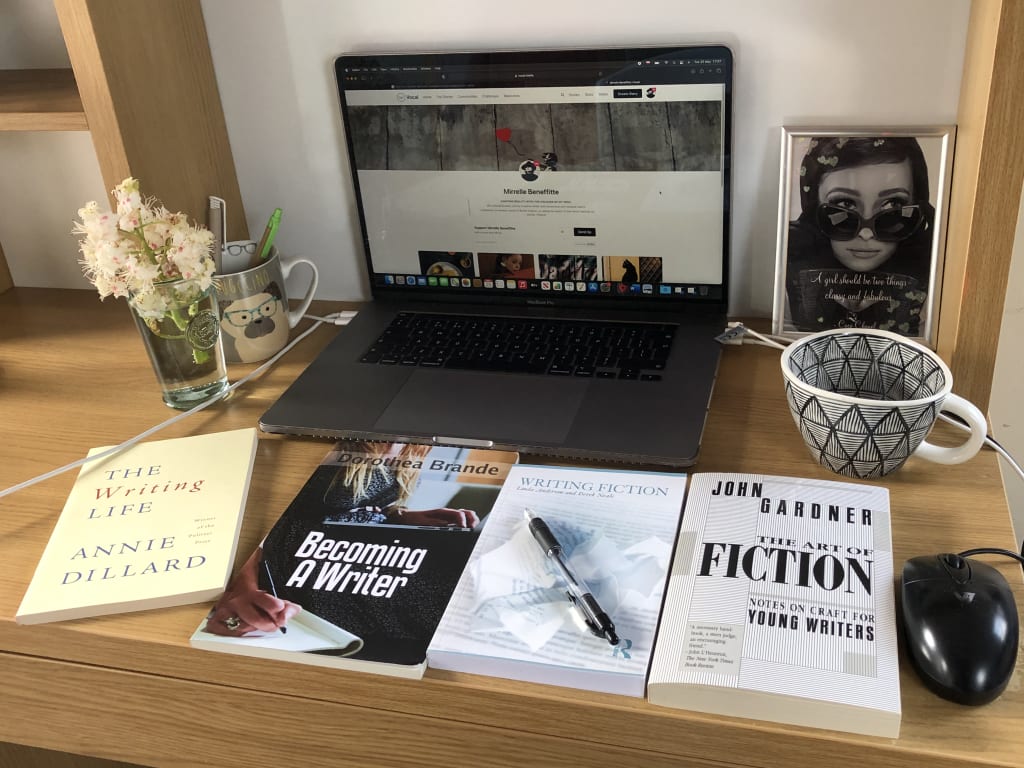
Before I write down one word, I have to have the character in my mind through and through. I must penetrate into the last wrinkle of his soul.
– Henrik Ibsen
I am a self-taught writer with eleven years of experience. I started writing because of a broken heart that prevented me from completing the postgraduate publishing course that I had started at that time, but gave me a purpose to write. I was filling out blank pages in a Word document on my first laptop with words of love, compassion, and an anger whilst the person I was writing to went back to his former girlfriend. It happens, ç'est la vie. I was sending him my poems in batches by post as I kept his address. I still have it in my things as I have never forgotten. I have never forgotten that the person who hurt me the most, who hurt not only my feelings, but also the fragile faith in a human heart, is responsible for my talent. I am convinced that I have talent, yet all my life I have received so much ignorance, disbelief, and rejection that I try to keep my “hobby” to myself. At least in front of strangers. For the past nine years, I have treated this as a hobby simply because the first attempts to publish my books have ended in a feeling of failure. When in 2012 I finished my first book for adults in Polish with a working title “Maximum – Minimum”, I started abruptly terminated crusade through publishers sending them a copy of what I’ve produced over the past year. In Poland, the publishing market is slightly different than anywhere else in the world. The nation loves what’s already tested, familiar, and famed, meaning: if you are an actor, a singer, or a person known “from somewhere else”, you can publish, no problem. Any new book about Agnieszka Osiecka (famous Polish songwriter with whom almost every musician wants to have something to do, although you can’t meet the lady of the song on this world since 1997), Holocaust (yes, still!), or off the shelf with children’s literature can find avid readers, if you’re an expert in the field. By “expert” I mean that you’re somehow involved through your work: in show business, at the university, work with or have children, respectively. Without strong support, or rather a connection to the literary world, you’re nobody. Like me.

At the age of six I wanted to be a cook. At seven I wanted to be Napoleon. My ambition has been growing steadily ever since.
– Salvador Dali
My postgraduate studies meant to open that door for me. I wasn’t writing full-time then, but I could have easy access to a world that would be my own omnipresent oasis. My fellow students were unable to spell words correctly during dictations due to their dyslexia, whilst I was writing with only a few spelling mistakes (these commas in Polish are just ubiquitous!) and already participating in the National Dictation Competition (without success, yet still I dared to do it!). This is called ambition. Ambition to exceed myself in everything I do, or at least in everything I’ve elected to excel at, especially in writing. Why? Because this is the profession I’ve chosen, correction: this is a profession that chose me long before I knew about it! You’re probably perfectly aware that unpleasant experiences tend to teach us the most important lessons, and if you happen to go through them with a fine-tooth comb, and what’s more – you rearrange it into something new with conclusions for prospective future, what could be more important than that? I figured this out long time ago (those eleven years!), and it materialised in my book and poems.
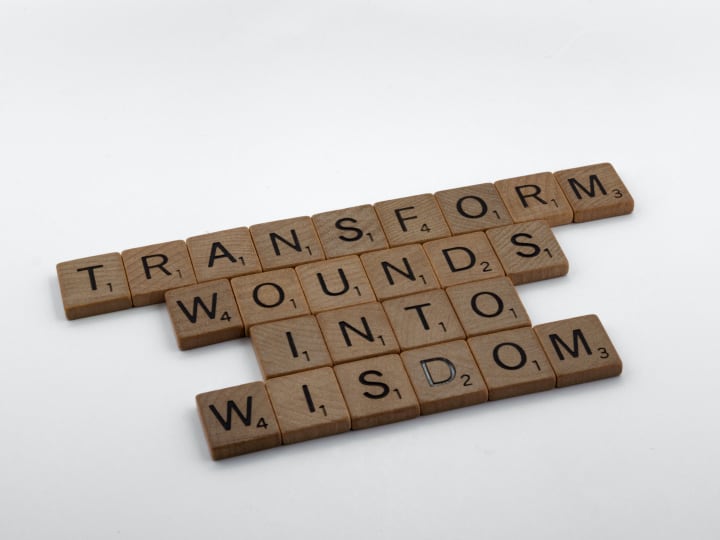
Writing is a way to work yourself into a subject and make it your own.
– William Zinsser
The year 2010 ended for me with four full volumes of poetry (unpublished), each containing exactly 99 poems. I’m so creative that I’ve come up with different pen names for each book, but I have to admit that Mescaline Brisset is one of my favourites. Then there was another boy and another 99 poems titled “Perfect Affection” dedicated solely to him, yet I didn’t dare to show him my creative work as I knew he didn’t love me. Cruel life again. Instead, I gave him the manuscript of my first book, and he praised me, but nothing more than this. Our paths have parted, so I can confidently say that my writing, especially poetry, is a self-help, caring for myself: wading through love, dealing with difficult family relationships, creating a fiction based on feelings of failure. Writing is cathartic, writing is cruel to the crisis, it makes it completely evaporate. It allows me to find inner peace and cross the deepest oceans to reach the waterfall. It’s liberating. Emotions, thoughts, moods tend to turn into distant states of mind after a solid part of the writing session. Writing is like seeing with an extra eye, the inner eye of the soul. To write, you must have a special sense, similar to the hunger receptor in your brain. There’s also a writing receptor, but not everyone is lucky enough to discover it as it’s hidden much deeper than other receptors, so it’s not as evident and essential for survival. Yet once discovered, it stays for longer because its roots are more grounded, more spread, more resistant. I’m sure any writer would agree with me, right?
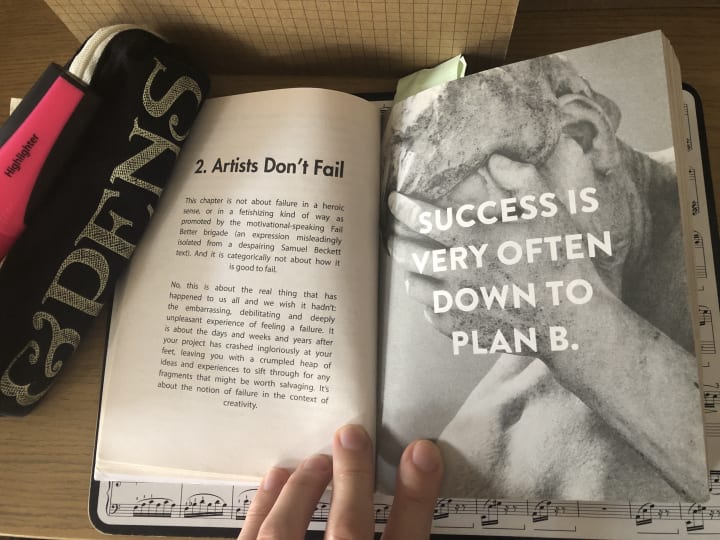
A work of art is the unique result of a unique temperament.
– Oscar Wilde
In 2013, after landing on a foreign land in Great Britain, I also happened to finish another novel in Polish (tentatively titled “Artikolada”), this time for children aged 10-13, written for a competition. Although I missed the deadline as I was working full-time at the time, the contest also failed as it was announced that they didn’t receive enough high-quality entries, so they closed it without picking the winners. How unlucky for me again! But that experiences definitely taught me the most important lesson: when one solution fails, finding fast the next opportunity will save your ass. So, after some immersion in a professional work that wasn’t related to writing (I was a labourer in a warehouse, a store and optical assistant who once wanted to be an optometrist, yet the number of obstacles surpassed my passion which has entirely disappeared, unlike the writing profession that has accompanied me for over a decade), I started writing my first novel in English. It was the GCSE English complimentary course I completed in England in 2019 that opened my eyes to things existing in a world parallel to mine and I could use it to my advantage. There was also a place where I lived then. This place and the street became an inspiration for the second book in English, for which I already have an idea and a few pages penned on paper.
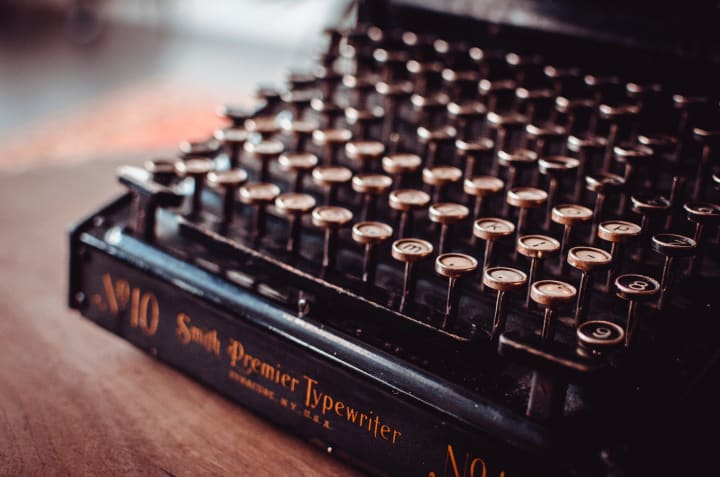
I'm with you in Rockland
where we are great writers on the same dreadful typewriter
– Allen Ginsberg, Howl
Writing on Vocal is not my only writing activity, yet I must admit that with Vocal for the first time, I can make a small amount of money doing what I love the most. I know I’m not very good at writing advertising material, or “How to” articles, or articles about fashion, food, politics and so on. I know that I’m good at crafting fiction. I know that my passion has guided me through the years without a significant cessation, and the only reason I couldn’t pursue my goals at full speed was in lack of time, not in lack of inspirations. Right now, I’m trying to finish my first English book (the one I started over 2 years ago). It’s harder to write this book, not only because it’s in a language I learned and wasn’t born in, but also because it’s in a genre I’ve never tried before, or even been a fan of: crime fiction. It’s not strictly a detective story as it also contains elements of romance and fantasy in a dystopian environment. Patricia Highsmith is definitely one of my favourites on the subject, and A. A. Dhand is following in her footsteps. I always read the classics, yet crime fiction has that subtle element of a great surprise to it, perhaps allowing me to look at the genre with a fresh eye.
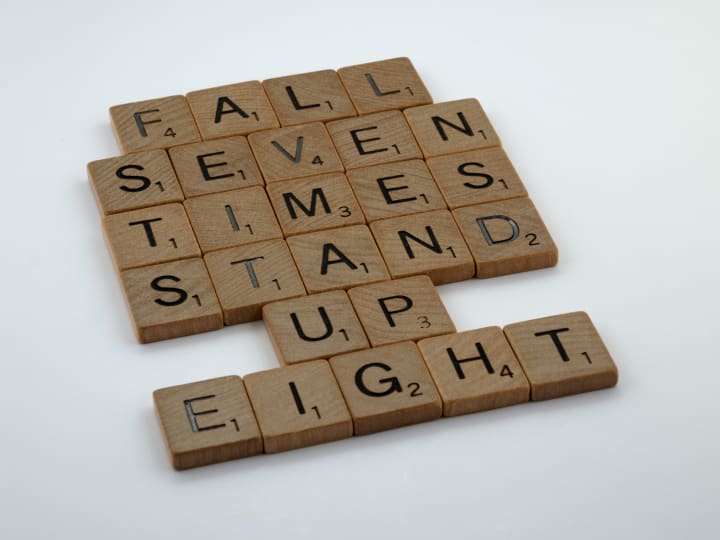
The year 2021 was already unsuccessful, if I think about the contests: I have never won a Vocal Challenge (maybe this time Mr. Liquid Luck will knock on my door?) or a competition to write a book for children aged 4-10 in my home country. The chances of winning the latter are usually equal to winning the lottery… or winning the Little Black Book Challenge. I observed that all the winning women (sic) have children! I have no kids, so why should I win? Although we were supposed to write anonymously, I did provide my personal details, so it’s not that much of a clandestine competition completely. But one can surely try. I wrote three different children’s stories for this contest, and I even had ideas for the second part of one of the stories I submitted. In a fabulous book I recently discovered, titled “Think Like an Artist”, Will Gompertz is mentioning that “the feeling of failure (…) is an inescapable part of any creative process. And it’s not nice. But unfortunately, it is an essential component.” I couldn’t agree more.
A LITTLE ABOUT THE ART OF WRITING
An inspiration
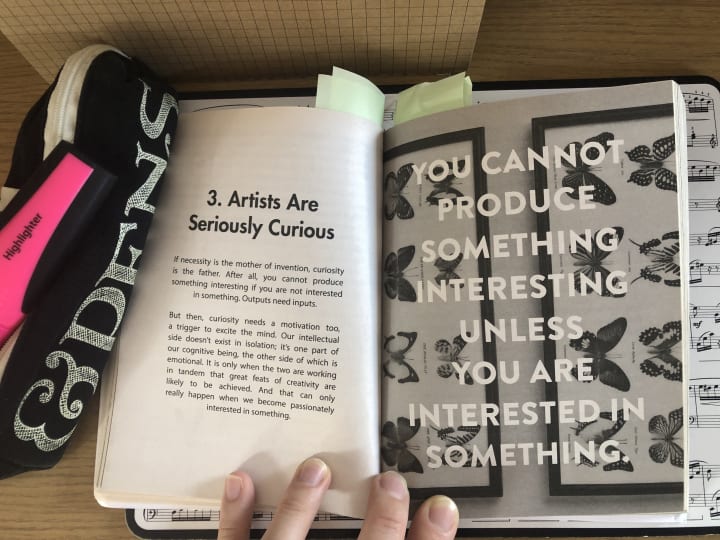
The ignition spark is conveniently distinct for poetry and prose. Writing in verse strikes like lightening. I find it difficult to go back to contain words in short form once I’ve already taken notes or even thought of something. It has to be written while your mind is speaking. Unless it’s something like a Shakespearean sonnet or poetry written about abstract metaphorical things or history, then thoughts can be intertwined with facts and it just takes time to transpose them into poetry. In the case of prose, the opposite is true – the idea will pierce your eyes like a blatantly exposing outfit, yet the final product will only be obtained by carving the words into a perfectly rounded piece. And then there must be corrections, in both poetry and prose, without exception. So, as you see, each type of writing has its own unique spirit, requiring a writer to have a different state of mind.
Are you a pantser or a plotter?
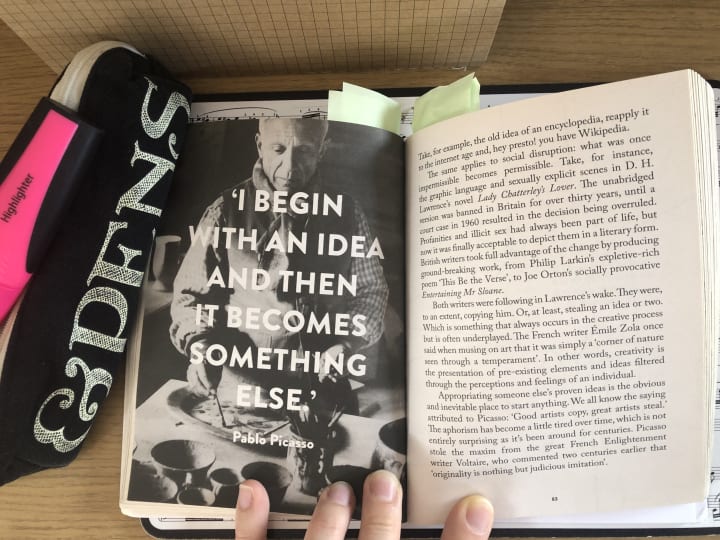
I am more of a pantser than a plotter. I wrote my first books without a plan, or long hours of sketching the character and the arc of the story. No. Walking through the streets of one of the largest cities in Poland, I invented a hero out of my blood, sweat, and tears, turning circumstances into a more universal story of survival in a contemporary microcosm built of betrayal of the soul, lost hopes, and feelings found on the ruins of the old world, leading in the last chapter to surreal hell. Above all, being a pantser doesn’t mean that I don’t have a plan. I’m plotting my stories all the time, using my own life or the lives of others, and adapting them to the times and the ever-changing situation around me.
Alone
Loneliness does not come from having no people around one, but from being unable to communicate the things that seem important to oneself or from holding certain views which others find inadmissible.
– Carl Gustav Jung
Sometimes I feel like ploughing a lonely furrow, even being surrounded by books and knowing about other Vocal creators from Facebook groups. But the creative process itself is as lonely for me as a man in the desert. And mine is particularly lonely, against the global trend of giving constant advice, praise, and glory to a harsh or hilarious reality. I have to tell fictional stories to believe in a better world. The creation of fiction allows me to forget about earthly world and plunge into greater, deeper, wider aspects of my characters in the scenery of an altered human reality to suit the needs of the story.
Around
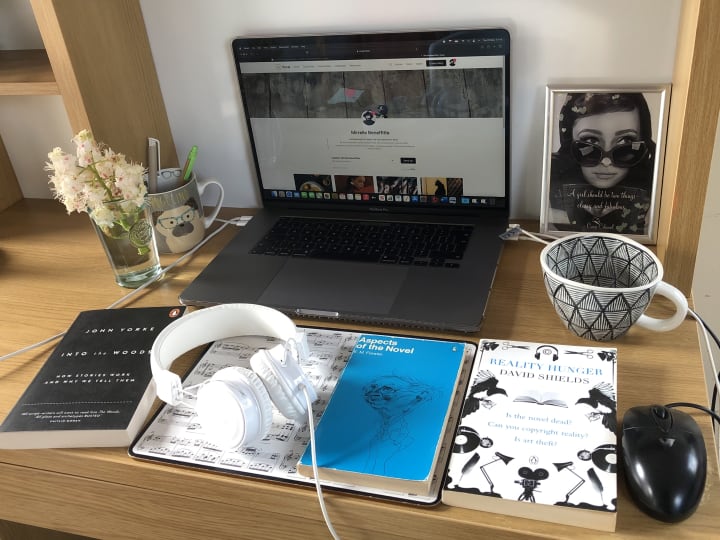
My ideal work space includes my laptop, music, rainy weather or night, and my angels and demons helping me to create. Without these vital elements, there would be no words written on a white sheet. Writing isn’t gaudy, loud, or easily noticeable as the reader has to focus to receive the message. Writing is about combining words into a moulded, meaningful masterpiece, as opposed to photography or art. I love art and photography, yet they’re different media, different environments, different audiences, only sometimes they overlap.
My world is complex. In one evening and one night (this is the best creative time for me since I was a teenager) I can invent and write something for the next chapters of my book in which I’m deeply immersed, or write and edit a poem, or edit an entire article for submission on Vocal. I can also distribute notes from my phone related to many types of my writing: poems, books, Vocal articles. I can do a lot. I am always looking for new challenges ahead of me, even though my mind works against me many times.
Devise, write, edit
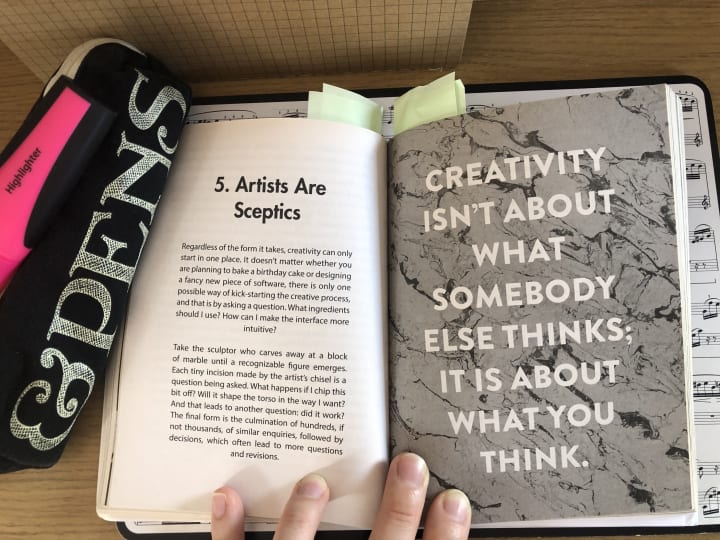
These are the three basic elements that I rely on. Everyone can write, just not everyone wants to. Anyone can write without corrections, yet imagine the book written yesterday that you read as the first draft. It may be a privilege, but it may also be a disaster. As a writer seriously thinking about my craft, I wouldn’t want my worst to come out in front of unknown people. And I’m a foreigner as well. I wasn’t born in an English-speaking country. While reading this, you’ll likely come back to check my spelling, punctuation, and grammar for errors. This is a typical reaction when people find out who I am. But guess what? I also check texts for errors, finding them in the most peculiar places of all kinds of writing: books, magazines, Internet… I guess I have this editor’s eye emanating from my mind’s eye.
THE RULES BY WHICH I LIVE AS A WRITER (WORK S-M-A-R-T) :
-S-how, don’t tell; instead of describing the obvious, refer to feelings, appearances, signs of events, not the events themselves. “Angry”? “Red face, tight fists, and throat” will do better. “Freezing”? “Goosebumps all over his body” will paint a more vivid picture in the mind of your avid reader.
-M-ake it surprising, not suspicious for the reader, your reader. Engage her/him in your story so that she/he feels like a key part of it, yet in the most boring, predictable, and familiar circumstances, change course of action. It is almost guaranteed that the reader will thank you from the bottom of her/his heart.
-A-sk yourself all the relevant questions. Where do you want your story to go and what is its purpose? Who is designed to read it? What kind of hooks can you include to keep the reader entertained or whatever goal you want to achieve with your stories? Why are you writing it? When you know all the answers – write, not earlier. Before that, you can only take notes with the intention to help you get where you want to go.
-R-elate to the audience; know what you’re talking about. Before you embarked on your journey, there were thousands of people going in the same direction, but with their unique eyes. Yours are unique too, just trust yourself.
-T-ry to use top shelf words with meaning and context seamlessly intertwined with your story. What I mean by this is making sure the smart word you intend to use isn’t misspelled, misused, or misinterpreted. It happened to me several times when I thought of one word and wrote another, or the proofreading in my Word document didn’t notice it or took it as a different word, therefore it wasn’t underlined. Be careful of this as it may distort your message.
PIVOT YOUR PASSION INTO PROFIT
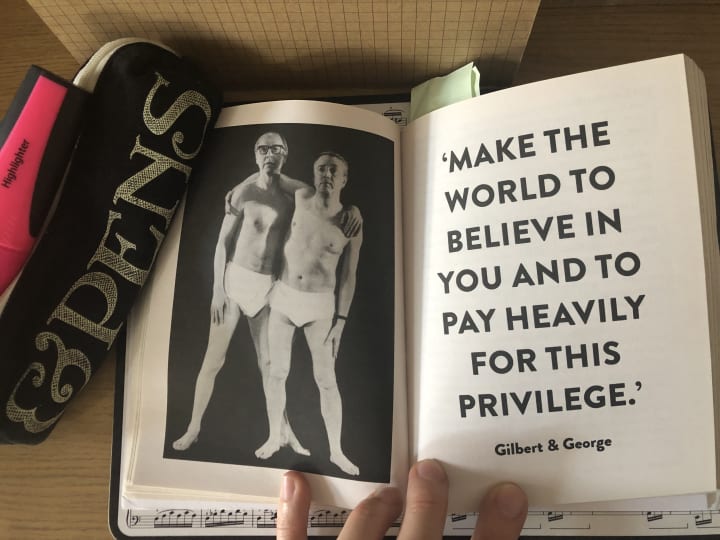
My dream is to be published traditionally, to be read, and not necessarily to be recognised all over the world, but to earn a living and not be forced to share my living space with strangers or pay someone for the place I’ve made my own. I wish to sign a deal with a publisher (don’t all writers want this?) and produce books every year or two to convey words from another world… or rather metamorphosed by the wires and connections of my brain, knowledge, and intelligence into a whole new value.
I don’t consider myself lucky enough with Vocal, suffice to mention that once I sent a poem of only 100 words that hung in my submitted stories for nine days (sic)! I took a screenshot with my phone, yet the photo size is 5.4 MB, so I can’t show it in this article – how predictable. At the same time, stories of other creators were promoted, edited with different pictures and republished, and I was told to wait for a review of a poem containing merely 100 words! That was frustrating, yet it didn’t discourage me at all. I believe nine is my lucky number as my real name and surname both consist of nine letters too. It’s a number connoting a constant change. Indeed, Vocal has its favourites (not mentioning any names) to support, yet in my eyes it’s almost political like the current circumstances in my country where forces are trying to fight for supremacy again (as if there was not enough in the past) and to read an independent newspaper one has to go one step further. Firstly, to get it; secondly, to face social ostracism for purchasing “the wrong one”; and lastly, to be left alone reading it and thinking the world is in the wrong place. I’m ready to wait for my turn. I have time. I’m patient.
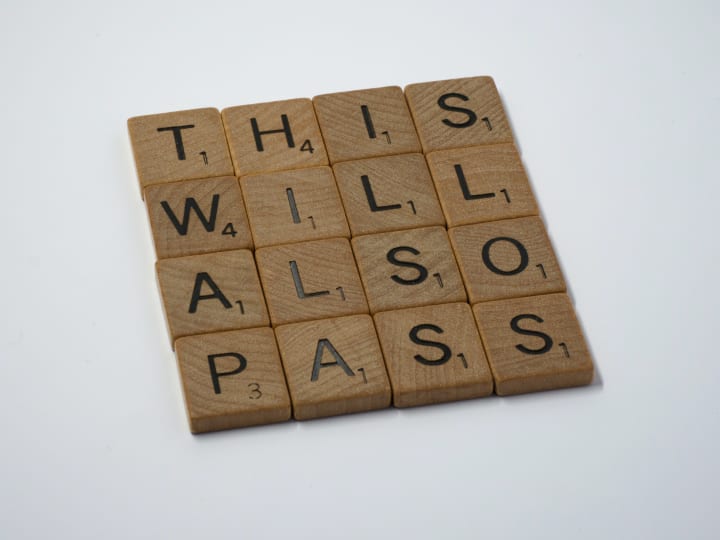
No one has ever supported me, neither financially – keeping me afloat, nor emotionally – providing spiritual guidance and faith in me for long periods of time. Only from time to time there have been, and there are, people around letting me know, that what I feel, think, and write matters. I know that my ideas matter for me as writing has been my main goal for years, although if you have to make a living, passion is relegated to the background, not as paramount as work that brings money. Present days are different. Practising my vocal with Vocal (pun intended) for a few months has taught me consistency that I hope will lead me through the rough path. I write regularly, getting closer to my destination step by step.
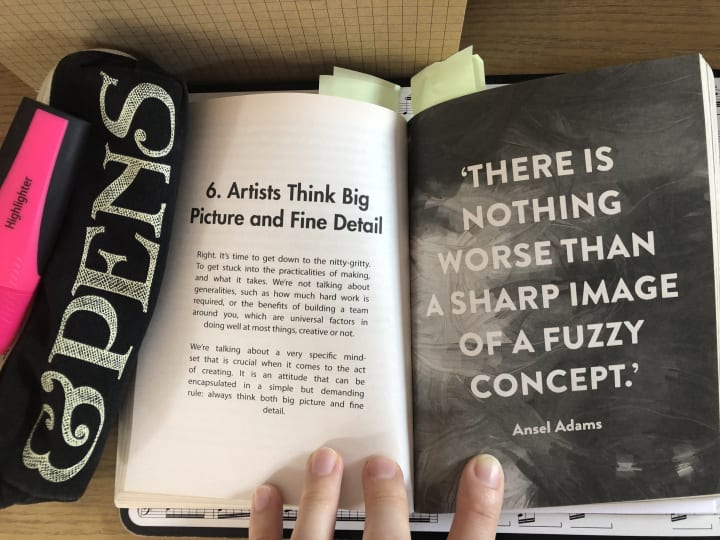
THE DUALITY OF A WRITER
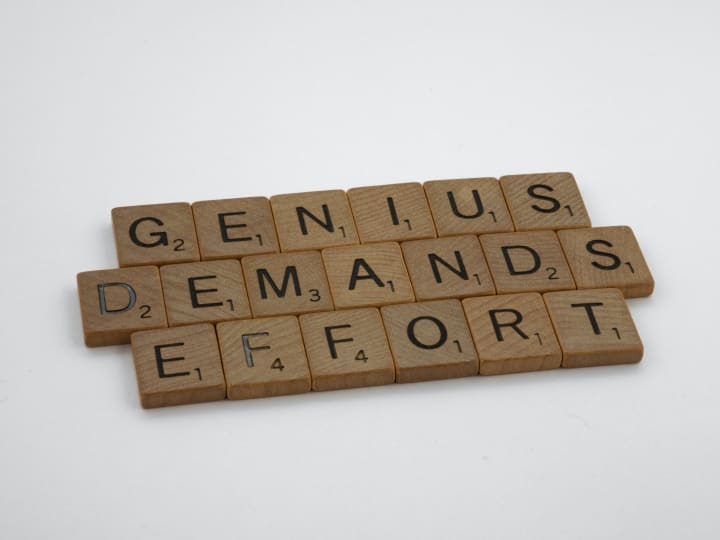
At the heart of all great art is an essential melancholy.
– Federico Garcia Lorca
Last, but by no means least, is my psyche influencing my life and writing. “I live with the threat of my extinction”, says Nicole Kidman who plays a writer Virginia Woolf in Stephen Daldry’s film “The Hours”. She was concerned that someone had to die for the rest to value life more, for the contrast, although she had a husband to support her in every aspect of her life. I’m trying to overcome my downtimes on my own and with the support of writing incessantly searching for the equanimity, mental stability. Writing this article was hard. It took some time. Normally it would fall over the course of a night or two, but if you get hold of doubts about your own existence, time stretches enormously over several weeks with the impossibility of coming back to the world of the living from the loops tangled around my neck, hands, and legs. But I’ve came back, thank goodness! I believe that writing has kept me alive on many occasions.
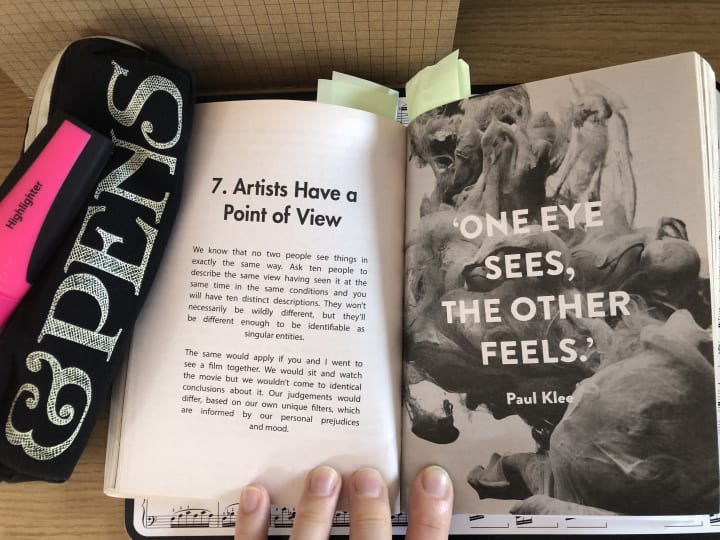
Writing is like a second skin for me. If it happens by chance that I refuse to write on some topic, closing it in the form of fiction, poetry, or an article, my lack of commitment will come back to me enforced by self-doubt. I would never want to let it happen for long. That’s why I try to keep an eye on the writing fire as often as I can. Dorothea Brande in her book “Becoming A Writer” whilst analysing the writing profession is mentioning the dual personality of a writer. First one is the conscious craftsman and the critic who walks the earth with as many obstacles as she/he can find. The second one is the unconscious, emotional, childlike artist who flies wherever genius takes her/him. “The idea of the alter ego, the other self, or higher self, recurs wherever genius becomes conscious of its own processes”. The secret lies in acknowledging that you are not one person, but two and you must “train both sides of the character to work in harmony”. I wish this to myself and to all of you, my fellow writers, reading my words. Don’t let your work be just a hardscrabble thrown into a sea of sharks. Dare to be confident and courageous.
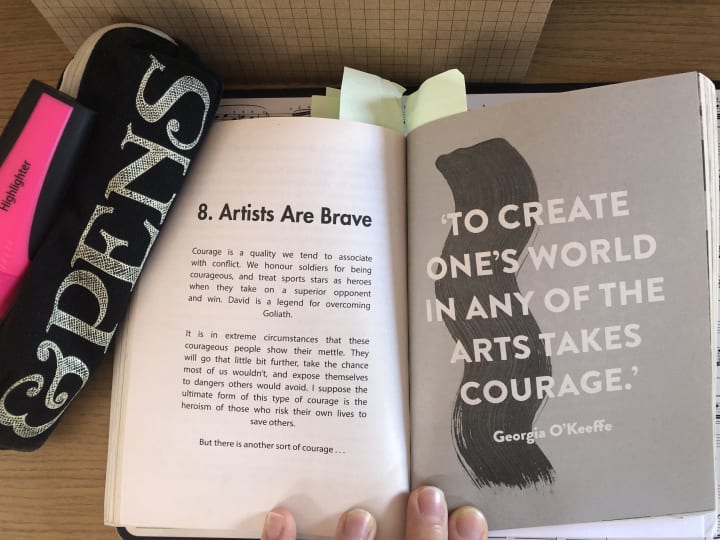
Big ideas come from the unconscious. But your unconscious has to be well-informed, or your idea will be irrelevant.
– David Ogilvy
*
Those sad eyes seen so many times
Like the abandoned puppy dog
Used to be caressed by its owner
But now forgotten futile face
Looking to be recognised, ravished, rewarded
By someone, if only a one
Member of the same population
Learned to recognise only recognisable
Leaving the rest in the purgatory of hell
*
I could use some support to change this world for a better, more understandable place for all of us as we all create it for ourselves.
After nourishment, shelter, and companionship, stories are the things we need most in the world.
– Philip Pullman
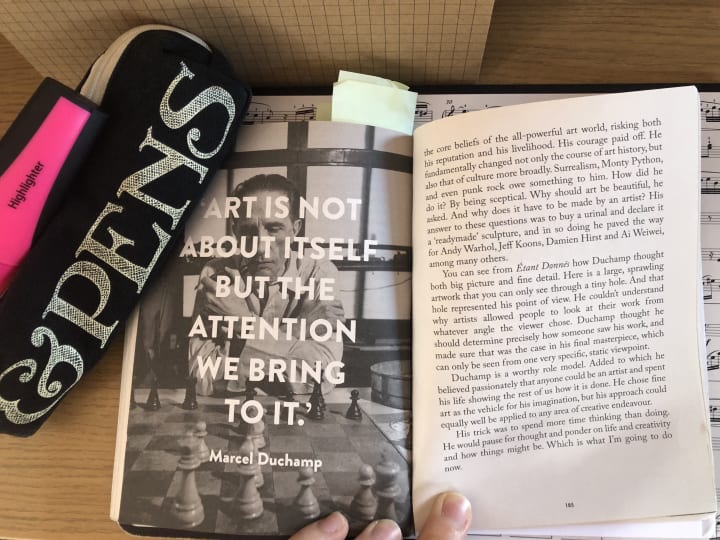
True glory consists in doing what deserves to be written, in writing what deserves to be read, and in so living as to make the world happier and better for our living in it.
– Pliny the Elder
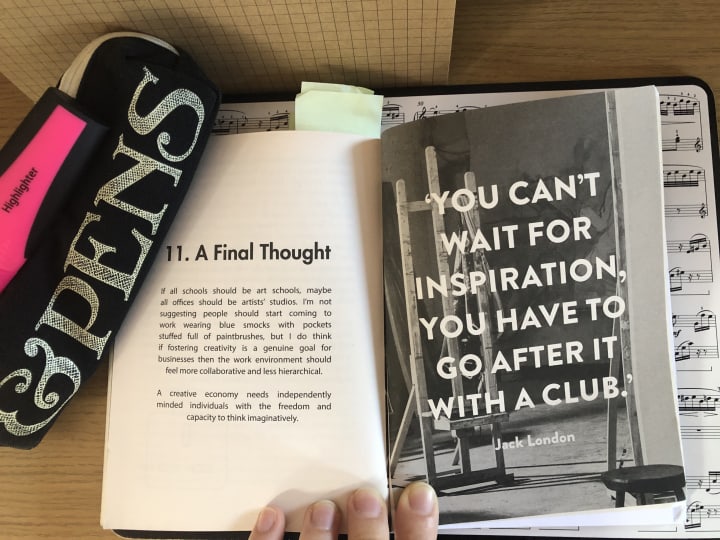
DNA threaded through it
I stick a needle into my scars
I try to make you feel it
On your skin, bones, muscles, and veins
As I experienced first-hand
Your second-hand occurrence is no worse
Like everyone else, we thread this needle to create the best kind of garment
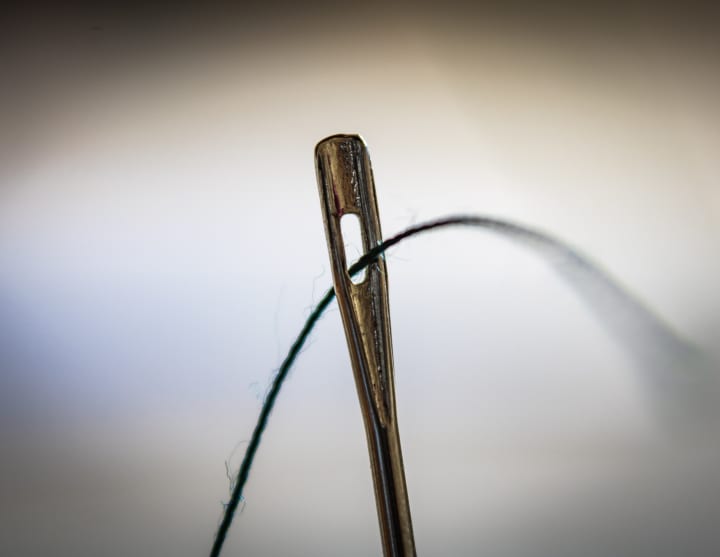
THANK YOU
***
Thank you for reading!
If you liked this article, you can add your Insights, Comment, leave a Heart, Tip, Pledge, or Subscribe. I will appreciate any support you have shown for my work.
You can find more articles, stories, and poems from Mescaline Brisset on my profile on Vocal. The art of creation never ends.
About the Creator
Mescaline Brisset
if it doesn't come bursting out of you
in spite of everything,
don't do it.
unless it comes unasked out of your
heart and your mind and your mouth
and your gut,
don't do it.
so you want to be a writer? – Charles Bukowski
Find me on Medium
Reader insights
Outstanding
Excellent work. Looking forward to reading more!
Top insights
Compelling and original writing
Creative use of language & vocab
Easy to read and follow
Well-structured & engaging content
Excellent storytelling
Original narrative & well developed characters
Expert insights and opinions
Arguments were carefully researched and presented
Eye opening
Niche topic & fresh perspectives
Heartfelt and relatable
The story invoked strong personal emotions
On-point and relevant
Writing reflected the title & theme

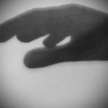
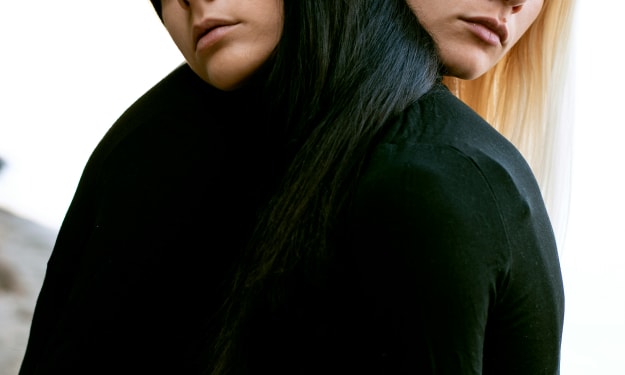



Comments (2)
Mescaline Brisset is not accepting comments at the moment
Want to show your support? Send them a one-off tip.